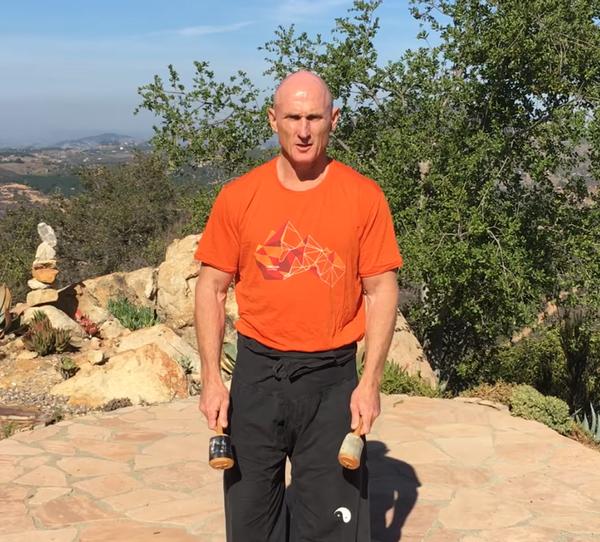Awareness: Learning to Feel Our Emotions
by Paul Chek

 Many people have a hard time feeling their emotions, or even consciously generating positive ones.
Many people have a hard time feeling their emotions, or even consciously generating positive ones.
Our Western culture and, sadly, most cultures today don’t provide us with training to enhance our emotional intelligence. Also, we are generally unaware as to how the way we care for our body or how we think are the most powerful generative forces behind our emotions.
In regard to feeling our emotions, I wrote this response to a question on my YouTube channel. I hope you find it helpful in your own life.
Nagadem Badoo: It’s very interesting, your work. When you spoke about feeding your emotions, what do you mean by that? Because food is very simple. You’re hungry, so you eat. Maybe, you need money to buy food, then you get money.
But with emotions? When you need love, you cannot buy it, you cannot take it and you cannot force it from (others). It comes when it comes and goes when it goes. Same with sex. All humans need sex, but you cannot force it, or demand it (or yeah buy it, but it would not fill the emotional need).
So, my question and point is how do you feed yourself emotionally? Because sometimes we want something but we also have blocks that keep us from that, like fear. Thank you!
Feed your emotions
That’s a good question. To feed one’s self emotionally means:
1. Having a clear dream for yourself, for your life to the best of your ability at any given time in your life.
2. Establishing healthy 4 Doctors values. Your “yes” has no value until you learn to say “no” to people, places, things or activities that are not dream-affirmative.
With regard to the “feeling” function of consciousness, emotions are generated either when we are in alignment with our dream/values (positive emotions) or acting in ways that negate our own path (negative emotions).
If someone acts against our values — not giving us the space we’ve requested, borrowing something and not returning it or returning that thing broken — we feel an emotional charge that reflects how we feel about that specific value being trespassed. This would be a “top down” means of generating emotions.
When we choose to do the things that generate positive emotions in us, be it art, dance, singing, playing, working on our dreams, contributing to the lives of others or consciously loving, respecting and caring for ourselves, we generate positive, life-/dream-affirmative emotions.
As we do such things, if we pay attention, we learn to feel our emotions, and understand how to feel and honor them when we are not being self-affirmative or feel trespassed by others.
These feelings enable us to understand what we are creating, allowing or accepting so that we recognize the emotions we feel come from what we perceive as negative experiences. These help us learn to be more conscious and make better choices.
3. Caring for your body within the context of the 4 Doctors. When we sleep effectively, eat high quality food in proportions that reflect our authentic individual needs and move our bodies in ways that give us the strength (our biomotor) profile we need to fulfill our dreams, many good things happen.
Our stress levels are significantly lowered, we have the nutrition on board to generate the neurotransmitters and hormones that support healthy emotional responses and learn to feel healthy emotional responses from a healthy body.
The feeling function of consciousness is directly tied to our capacity and willingness to engage in “awareness.” People can have everything in the world they want, and still not feel satisfied if they choose not to be aware of what they already have, are given or can give.
Be aware of your emotions
If we don’t put our awareness within our bodies, we diminish our capacity to feel emotions. This often leads to progressively greater levels of depression because not engaging ourselves with feeling and awareness narrows the frequency range of our feelings and awareness, so our lives and inner experiences get narrow.
With awareness, we can feel emotions that are generated merely with the changes occurring as we eat or drink, move or not move or breathe well or poorly.
With awareness, we can feel the emotions generated by each thought we engage or create, and can choose to experience the range of our emotions, and act in response to them in ways that are life-, health- and dream-affirmative.
We have programmed beliefs and behaviors that can cause us to make choices in relationship to ourselves or others that are suboptimal and produce negative emotions within us.
Yet, by being aware of what our dreams are, we can consciously choose to use these negative emotions to inspire deeper levels of awareness of what we want and be willing to create for ourselves and others.
An example would be finding a specific behavior of a parent or lover irritating and becoming reactive, defensive or mean in response. This often leads to a progressive degeneration of the relationship.
By feeling our emotional responses, we can choose to be aware that when such emotions begin to arise, we are being invited to ask ourselves, “Is responding to this situation as I have in the past going to create more love and harmony in my life or someone else?”
If the answer is “no,” we can then state our dream and seek a greater truth, or a more wholesome response. Instead of getting angry, we could simply say to ourselves, “My tendency is to get angry when my mother or father tries to control me. My dream is to have freedom in my life and enjoy my relationship with my parents.”
Then, we can turn the thought around from “My parents try to control me…” to “I allow my parents’ opinions to have more power over me than is healthy, and I’m an adult now.”
So, we can simply say something like, “Mom, I appreciate that you have an opinion about how I should do such and such, but I’m an adult now and I enjoy living and expressing myself this way.”
If this person continues to be negative or challenging, we may need to love them from a safer distance so that we can choose to keep generating love for them without the risk of further entanglements.
If we pay attention to our body and emotions, they often lead us to doing the things that “feel good,” be that expressing your creativity, resting, playing, eating things that support your needs or being honest about your feelings in relationships.
This is how we expand our emotional awareness and develop more emotional intelligence.
Expand your emotional awareness
 There are a wide variety of breathing practices, such as Holotropic breathing, pranayama breathing and others that help us better feel and become aware of our emotions.
There are a wide variety of breathing practices, such as Holotropic breathing, pranayama breathing and others that help us better feel and become aware of our emotions.
You may want to read Holotropic Breathwork: A New Approach to Self-Exploration and Therapy by Stanislav Grof M.D. and Christina Grof. You can also find many videos on the Wim Hoff method, or read this book to learn how to use breathing to regulate or create specific internal states and emotions.
A technique my soul led me to help me heal is to sit comfortably with meditative awareness, and generate love from within.
I do this by bringing my awareness to all of the ways and times I felt love. When I’m in that state, I begin to visualize that I’m inhaling the Love of Great Spirit, filling myself with that love. Then as I exhale, I visualize the Great Spirit’s Unconditional Love leaving me in all directions as a gift to all living beings.
As we inhale and exhale the Great Spirit’s Love, visualizing your heart chakra opening and breathing through this open heart-space allows us to “feel” the emotion of love, and all the beautiful effects it has on our body-mind.
As we practice, we become more naturally inclined to generate more love, and stay love-centered in our relationships with ourselves and others. We become calmer and more sensitive to the flow of energy and the dynamic range of our capacity to feel expands.
We feel more alive, and safer within ourselves as well as the world.
The teachings I share in the Holistic Lifestyle Coach (HLC) Level 1 Program go a long way toward teaching you the kinds of things I’m sharing here. (HLC 2 and HLC 3 go even deeper.)
My books, The Last 4 Doctors You’ll Ever Need and How To Eat, Move, and Be Healthy!, give you the essentials and support HLC 1 training too.
I hope this helps you, and everyone who read this!
Love and chi,
Paul



